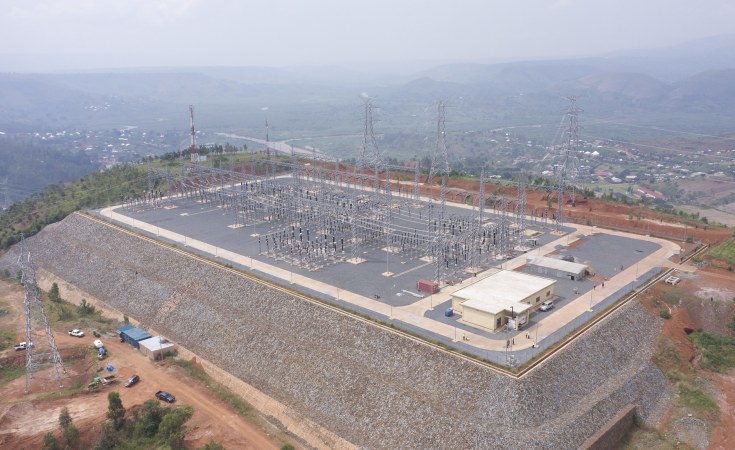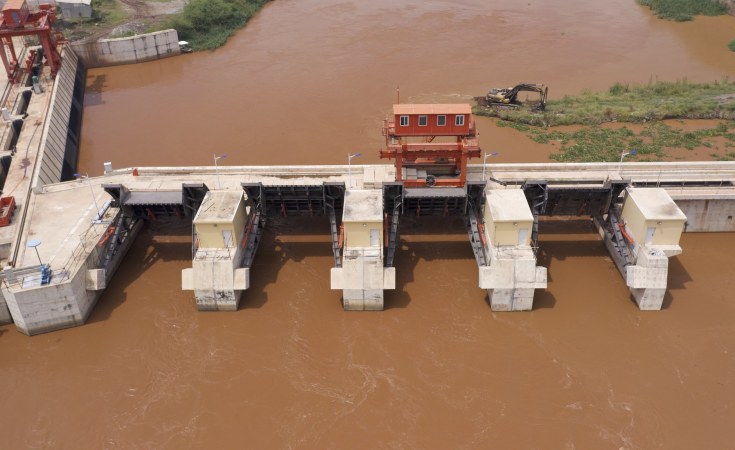- Cheap and reliable hydroelectric supplies mean that the Gitega hospital can spend more money on medical equipment and hospital teams can focus on saving lives.
"One day, in the operating theatre, there was a power cut́ in the middle of a laparotomy [opening of the abdomen] for a case of pelvic peritonitis. We had to finish the operation using a torch. It was very hard."
Dr Franck Arnaud Ndorukwigira, doctor and deputy director at Gitega regional hospital in Burundi, has unpleasant memories from the time when the facility had to rely on diesel generators for electricity. In order to have sufficient funds for other priority needs, the hospital was compelled to limit spending on diesel and therefore endure protracted periods of power cuts.
This problem has been overcome in recent months, thanks to stable and regular supply of electricity from the 80 megawatt Rusumo hydroelectric power station, whose output is shared between Burundi, Rwanda and Tanzania.
The station was built at a cost of USD 340 million, with the African Development Bank Group (AfDB Group) providing USD 107.11 million, including USD 97.31 million from the Bank Group's concessional lending window, the African Development Fund, and USD 9.8 million from another AfDB lending vehicle, the Nigeria Trust Fund. The World Bank and the European Union also took part in the financing.

As well as construction of the power station itself, the project also comprised the installation of transmission lines, including a 161-kilometer cable to deliver 27 megawatts of electricity to Burundi.
The electricity supply from Rusumo means that the Gitega hospital can now devote more resources to upgrading equipment and medical teams can focus on their primary mission of saving lives. The hospital has installed an oxygen production unit that meets its own needs and supplies gas to other regional medical centres. New incubators in the hospital's neonatal department are permanently connected to the oxygen generator, saving the lives of premature babies.
"It has made a huge difference," Dr Ndorukwigira says. "We took in a mother who gave birth to premature triplets at six months. If these new incubators were not connected to electricity 24 hours a day, we couldn't have cared for these babies properly and they would probably have died. Now the babies are gradually gaining weight and their mother is very happy."
The upgrading of electricity infrastructure associated with the Rusumo project is helping local businesses and households as well, boosting the regional economy. Additional work is now underway to extend medium-voltage power lines to more rural communities, promoting inclusive economic growth.

Ezéchiel Bagayuwitunze, who coordinates Burundi's share of the Rusumo project, described the overall impact the project is having for his country: "Previously, the town of Gitega and the surrounding districts suffered frequent and long power cuts and major drops in voltage, due to electricity shortages and low capacity of the existing transmission cables. The installation of better cables and hydroelectric power from Rusumo Falls means that we can provide a better service to people in Gitega region and the country as a whole."
"By focusing its power supply strategy on hydroelectricity, Burundi is building a greener, more sustainable future, supporting low-carbon economic and social development," said Jean Barakamfitiye, the engineer in charge of the Gitega and Muyinga substations. "We have a vision of a developed country in 2040 and a rich country in 2060... The Rusumo project makes a major contribution to achieving that goal."
The power from Rusumo has also made it possible to shut down a 30-megawatt oil-fired power station, reducing dependence on fossil fuels and emissions of greenhouse gas. The closure of the thermal power station helps save USD 2 million per month, the cost of buying fuel and lubricants.
Click here for photos of the project.


